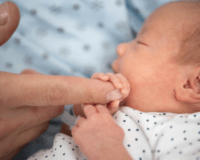Motherhood grows compassion

An upsetting thing has happened to me since becoming a mother almost three years ago, an awakening of sorts. Where I once went about my days mostly concerned about my own well-being and the health and safety of those closest to me, I now find myself regularly undone when I see or hear of suffering in another’s life.
It started small—crying during Little Women when Meg said she felt alone, tearing up seeing Facebook posts about kids who were sick, trembling at the thought of something happening to my girls. Hearing about suffering caused a surge of gut-wrenching compassion that alarmed me.
As a kid, I confusedly watched my own mother cringe at headlines or say something like, “I just can’t watch that,” when we were choosing movies. What I had once attributed to weakness, some foreign power that made my very strong mother very emotional, was now my reality. At first, I marveled at what felt like a newly torn hole, a whirlpool of compassion that drew in anything that came near, but soon realized that this sensation was here to stay, locked firmly in my life, scooping up any passing grief with unrestrained emotion.
When it was said in response to the murder of George Floyd, “All mothers were summoned when George Floyd cried out for his momma,” I cried as the puzzle pieces snapped into place. Every mother was summoned because every mother has been awakened to a new depth of mercy coursing through her heart. The sad privilege and sin of only caring for oneself dies when a woman becomes a mother, her life and body now permanently put on guard, ready to go into battle for another. Ready to hold and hug and listen and be called into action.
The problem, of course, is that suffering is everywhere. Suffering from the pandemic and racial injustice, suffering for refugees and persecuted Christians, suffering for my family and friends and yours. I find myself overwhelmed by a compassion I did not necessarily choose or cultivate but was rather thrust upon me like my own twin daughters on my chest when they were born at 3 a.m.. But what I have largely processed as being a burden uncovered by motherhood, newfound compassion is not a loss, it is a gain.
Upon entering motherhood we are swept into a greater mission that goes beyond merely caring for and protecting those who are close to us. We become mothers, allies, and protectors of others’ children, young and old, of other mothers, of any who might stir compassion in our widened hearts. Though motherhood is not the only vehicle for growing in compassion—Jesus was never a father and yet is our exemplar of mercy—motherhood takes us out of ourselves in a literal way, asking us to care for another no matter how weak or weary we may be. This ability and depth is terrifying, but it is also a gift.
Embracing this change has not been clean or simple. In my fear of this new mercy, I find myself trying to hide or simply look away in a sad effort to feel less. I want to evade the swell of pity and sorrow that rises, desperately try to unbear this burden or allow it to drive me away from compassion into worry and anxiety. A fire of mercy had been stoked, but I am desperately trying to extinguish it. To feel compassion unrestricted is to feel too much. For many, motherhood may not be the primary place that the Lord chooses to widen your heart in compassion, but if you find yourself undone like me, take heart. We can and must learn to wield and embrace mercy as part of our identity rather than hide from it.
Compassion as discipleship
Compassion is a gift that is designed to reshape our lives and bodies to care not merely for our children whom we love, but for all children of God. It is a gift from a merciful Savior who is committed to transforming us into his likeness and his likeness is deeply merciful. He is “the Father of all mercies and God of all comfort who comforts us in our affliction, so that we may be able to comfort those who are in any affliction” (2 Cor. 1:3-4). It is his will for us to care for the widow and the orphan (Jas. 1:27), to give generously of ourselves and our time in the exact same way that he did.
Mercy, therefore, becomes one of the most important paths of discipleship we can tread because it takes us into the heart of Christ and out of our concern solely for ourselves. We must be willing to shake off the temptations to hide from compassion or look away so that we might learn what our God has ordained for us in motherhood—a heart rich in mercy and willing to comfort those who suffer.
A mothering God
Growing in compassion through motherhood is no accident or hormonal adjustment. It is woven into God’s perfect design, written into our hearts before we knew it was there so that we might one day more deeply understand the height and depth and breadth of God’s love and compassion for us. In grief over his lost children, Jesus said, “Jerusalem, Jerusalem…how often I have longed to gather your children together, as a hen gathers her chicks under her wings, and you were not willing” (Matt 23:37). Merciful Jesus longed to care for his people like a mother hen, drawing his people to himself to provide for and protect them as a mother does.
But the power of a mother’s mercy is not only found in the tenderness of Christ. We see it in the enduring compassion of the Father when he expresses his love for his children by saying, “Can a woman forget her nursing child, that she should have no compassion on the son of her womb? Even these may forget, yet I will not forget you” (Is. 49:15). He says, “Behold, I will extend peace to her like a river…and you shall nurse, you shall be carried upon her hip, and bounced upon her knees. As one whom his mother comforts, so I will comfort you; you shall be comforted in Jerusalem” (Is. 66:12-13). In our Father’s steadfastness, he compares himself to a mother who nurtures her children, carrying them close, feeding and comforting them.
God chose to talk of the depth of his compassion in terms of motherhood because motherhood is uniquely powerful. In his perfect and inspired Word, our God holds motherhood in such high regard that he expresses his own commitment and devotion to his people in terms of it. If our Father chooses to widen our hearts through motherhood, it is so that we more fully understand his—one that longs for his children’s flourishing and would do anything to make them know his love.
The courage to follow
Growing in mercy will grow us in godliness because Jesus is mercy at his core, breathing and bleeding compassion, bearing the weight of a broken world to the point of death so that we don’t have to hide in fear from it. We must be brave and humble, willing to feel the pain of our brothers and sisters, to bear the burdens of others, to weep with those who weep, and follow merciful Jesus to the end. The Jesus who touched our sores and wiped our tears bore it all, not so I could hide from a compassion like his, but so that I could receive it myself. To come alongside him in his work as one willing to face suffering with the hope of knowing the worst we encounter here will be redeemed to the fullest one day.
Christ, the merciful and compassionate, showed me mercy so that my heart might break like his—not to protect me from feeling broken. I may fight the swell of compassion because it feels like weakness, but in Christ, our mercy is our greatest strength. He plants compassion in our hearts to rehumanize and reawaken us to his kingdom coming. The choice we make is not whether to feel, it is whether to hope that the resurrection is true and real and tangible today, putting in its place our suffering as a light and momentary affliction; a signpost that we are not yet home, but we are growing as we walk this path of motherhood.
Consider a few extra resources:
- Eyes wide, lights shine: Teaching your kids to see others
- Teaching kids to love their neighbor
- Do our prayers really matter?







